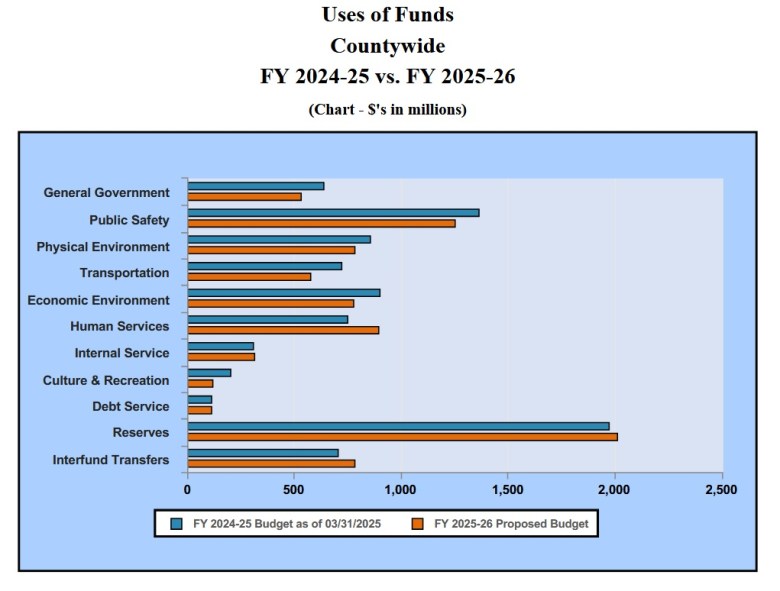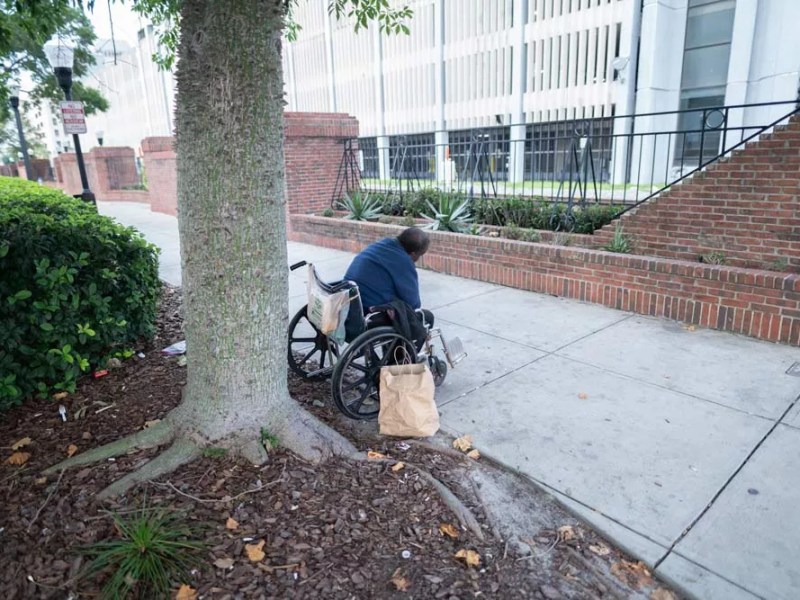Less than 24 hours after receiving a sharp rebuke by Florida’s chief financial officer, Orange County commissioners Tuesday slammed the state official’s allegations of “wasteful spending” by in part defending the programs the county is funding to address issues such as homelessness.
“The fact that the state is criticizing how Orange County uses its revenue to help give people like veterans and families hope and dignity, and to call it wasteful, not only lacks morals,” argued county commissioner Dr. Kelly Semrad, “it lacks what is the most fiscally responsible choice that we could give to our taxpayers, which is to get people off of the streets, get them into housing, [and] provide solutions so that they can re-enter the workforce in a stable way.”
Semrad, a community advocate and professor of hospitality management elected to County Commissioner last year, has been unabashed in her own criticism of the state’s initiatives on homelessness and immigration, vocally opposing efforts by the state to all but criminalize the act of being homeless.
The six-member Orange County board of commissioners, plus Mayor Jerry Demings, received an update on the county’s efforts to address homelessness Tuesday as part of their regularly scheduled public board meeting. It came just a day after Florida chief financial officer Blaise Ingoglia, a DeSantis-appointed official leading a state “Department of Government Efficiency” initiative, accused Orange County of nearly $200 million in “wasteful spending.”
“Your local government here is taking the money and spending it and expanding government, creating new programs that probably shouldn’t be paid with your tax dollars, expanding already existing programs that are paid by your tax dollars, and just wasting it willy-nilly,” Ingoglia, a former Republican state Senator from Hernando County, declared at a news conference Monday.
Orange County’s proposed budget for the upcoming fiscal year currently sits at $8.2 billion. Although the vast majority of that consists of county reserves (which serve as a rainy-day fund to cover unexpected expenses), that budget is also used to fund the continued operations of various county departments and programs, including (but not limited to) public safety, transportation, infrastructure and housing services.

According to Lisa Klier-Graham, Orange County’s mental health and homeless division manager, the budget includes nearly $60 million earmarked this year specifically to address housing and homelessness issues, up from $45.6 million the previous fiscal year. County leaders committed an extra $10 million to address homelessness issues last June after Florida Gov. Ron DeSantis signed into law a statewide ban on public camping (HB 1365). The law specifically aimed to get homeless people off the streets — without offering any sort of financial assistance to help cities and counties do so in a humane way.
“Recently, we were criticized because our budget has increased,” said Mayor Jerry Demings, a Democrat who is reportedly considering a run for Florida governor next year himself. “So has the myriad of challenges that we face.”
Demings added that Orange County has chosen to lead “with compassion” by taking a housing-first approach to homelessness and establishing an enforcement mechanism for the statewide public camping ban that prioritizes the provision of resources, such as information about nearby shelters, over immediately throwing someone in jail for having nowhere else to sleep at night.
“Orange County implemented a very streamlined and compassion-driven process for addressing complaints, ensuring both effectiveness and empathy in service delivery,” said Klier-Graham. “The empathy in service delivery and the compassionate approach was really, really important to us,” she added.
An annual count of the county’s homeless population, conducted this past January, identified nearly 2,000 homeless people in Orange County who are either temporarily living in homeless shelters or who have no shelter at all. Regionally, children and older adults made up more than 40 percent of the region’s homeless population.
Klier-Graham confirmed during the board meeting that the state government has not provided any financial assistance to Orange County to help address issues concerning its homeless population in the wake of the new law, prompting a scoff from Demings.
“Some people outside of local government sometimes forget that they ought to be part of the solution,” Demings said. “Anybody can identify the problem, but it takes some courage, some commitment to help identify the solutions.”
Orange County is one of more than a dozen Democratic and Republican-leaning city and county governments in Florida recently targeted by the state’s ‘DOGE’ team, which is modeled after the federal DOGE initiative initially led by tech billionaire Elon Musk under President Trump.
CFO Ingoglia however — a Trump ally and former chairman of the Republican Party of Florida — has made a spectacle of calling out Orange County in recent weeks as his team of auditors have dug into local governments’ finances. In late August, he announced his office had issued subpoenas to 16 county staffers, alleging the county staff was purposely trying to withhold or hide information about county spending related to diversity, equity and inclusion.
He has claimed that, instead of allegedly spending county funds on “wasteful” programming, Orange County could lower its tax rate to offer property tax relief for local property owners. According to county budget documents, the current county budget maintains the 11th lowest tax rate of all 67 of Florida’s counties at $4.43 per $1,000.
Ingoglia did not outline specific areas of wasteful spending during his press event Monday, but reportedly teased (as he did last month) that examples will be revealed in a new audit report. The publication of that audit report is yet TBA.
What is Orange County doing to address homelessness?
Tuesday’s presentation from the county mental health and homeless division outlined a number of ongoing and future projects the county is working on to address longstanding issues of homelessness that were exacerbated by skyrocketing rents during the COVID-19 pandemic.
Renter households make up 37 percent of all households in the Orlando metro area, according to the National Low Income Housing Coalition, which extends from Kissimmee up to Sanford. Orlando has consistently ranked as one of the most cost-burdened metros in the U.S., with 61 percent of renters spending more than 30 percent of their income on housing costs alone.
Klier-Graham, tasked with overseeing the county’s efforts to address homelessness, said the county is taking a “holistic approach” to the problem. The county has both expanded and created programs, for instance, offering temporary or permanent housing for the unsheltered population that is coupled with career development services, social and mental health services, and case management to get people on the path towards stable housing.
Eviction prevention for pregnant mothers
One of their new programs, launched in February, focuses on eviction prevention for pregnant and new mothers, according to Klier-Graham. It offers direct financial assistance for recipients that can be used to help cover housing, utility and mortgage costs. It’s helped 43 families so far on a budget of $140,000, including 26 pregnant women and 17 new mothers with children under 3 years old.
Klier-Graham said the program “reduces the risk of displacement at a time when secure housing is really essential for both the physical and emotional well-being of the mother and the little ones.”
Job training and career development
Another county program that launched in August, developed in partnership with First Step Staffing, connects people experiencing homelessness with job coaching, transportation to work, and job placement in county government divisions. The program, as part of the county’s “broader efforts to tackle homelessness through economic opportunity,” has so far gotten 14 people jobs in public works and utilities, according to Klier-Graham.
An accelerated skills training initiative in partnership with Valencia College, offering months-long vocational programs, similarly emphasizes a pathway towards gainful employment for people experiencing homelessness. “Our division houses them in the meanwhile and gives them supportive services [and] also provides them with food,” Klier-Graham explained. “But when they graduate, they actually have a certification where they can make high, livable wages.”
The county has also invested funding into a temporary housing program for older adults, a transitional housing program for adults with co-occurring mental health disorders, a program that offers temporary housing in hotels specifically for families experiencing homelessness, and county-wide case management training for staffers in agencies that interact with homeless people.
What’s on the horizon
Projects in the works include finding a location for a new homeless shelter (as the county is currently facing a shortfall of roughly 800 shelter beds), a housing program specifically for young adults aging out of foster care, and overnight shelter in trailers and a retrofitted bus, similar to a program recently launched by the city of Orlando.
Despite the grim picture painted through this year’s homeless count in Central Florida, Orange County overall saw a slight decline in its homeless population. Klier-Graham said it’s too soon to determine what caused the roughly 2 percent decline they saw from 2024 to 2025. But she remains hopeful that the county’s on the right path.
“We know that challenges remain, without a doubt,” she admitted. “But these improvements and many of the success stories that we hear every single day show that our strategies are working and reinforces our commitment to carry out this important work.”
Subscribe to Orlando Weekly newsletters.
Follow us: Apple News | Google News | NewsBreak | Reddit | Instagram | Facebook | Bluesky | Or sign up for our RSS Feed
Source link



